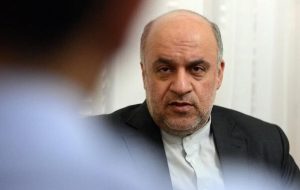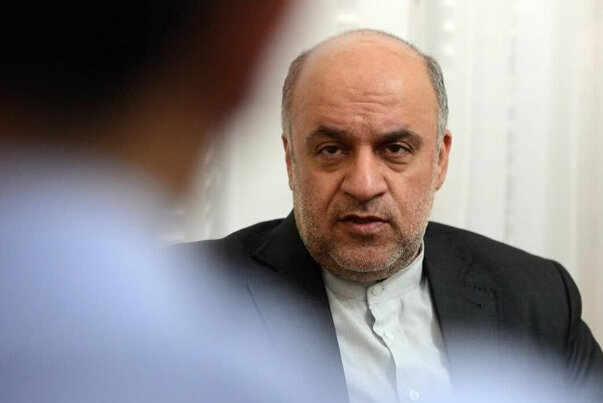Iranian envoy to Lebanon resumes duties, says renewed terrorism won’t break Resistance Front
TEHRAN – The Iranian Ambassador to Lebanon, Mojtaba Amani, has returned to Beirut after spending two months in Tehran recovering from injuries sustained in an Israeli terrorist attack. Amani was wounded in a series of pager explosions in late September alongside thousands of Lebanese people. Israeli Prime Minister Benjamin Netanyahu recently admitted that the regime


TEHRAN – The Iranian Ambassador to Lebanon, Mojtaba Amani, has returned to Beirut after spending two months in Tehran recovering from injuries sustained in an Israeli terrorist attack.
Amani was wounded in a series of pager explosions in late September alongside thousands of Lebanese people. Israeli Prime Minister Benjamin Netanyahu recently admitted that the regime was behind the pager blasts.
Upon his arrival, Amani was warmly welcomed by senior representatives of Hezbollah, the Amal Movement, Iranian organizations, and Raouf Sheibani, the Special Envoy of Iran’s Foreign Minister for West Asia.
During Amani’s absence, Sheibani had been based at the Iranian Embassy in Beirut, maintaining diplomatic relations and coordinating with Lebanese officials and groups on behalf of Iran.
The attack left Amani with injuries to his hand and eye, requiring his transfer to Tehran for medical treatment. The pager explosions, as a calculated act of terrorism, were seen as part of ongoing efforts by hostile Israeli forces to destabilize the region.
Ambassador Amani calls for collective support for Resistance
Following his return, Amani spoke to Iranian media Nour News about critical regional issues, emphasizing the importance of collective support for the Resistance movement.
He addressed the potential funeral of Martyr Sayyed Hassan Nasrallah, a key figure in the Resistance, describing it as a symbolic event that should unify the region and send a powerful message to the world.
“The martyrdom of Sayyed Hassan Nasrallah is an immensely significant matter that requires regional attention. His funeral should be a demonstration of solidarity and support for the Resistance, showing the world the unwavering commitment of the people to this cause,” Amani said.
He urged nations across the region to collaborate in organizing an international funeral befitting Nasrallah’s legacy. “This should be a monumental event that highlights the vital role he played and honors his contributions to the Resistance,” Amani added, calling for consultations to ensure the funeral appropriately reflects his impact.
Hezbollah’s late Secretary-General was martyred in an Israeli airstrike on Beirut on September 27.
‘Renewed terrorism in Syria sparks concern’
In addition to discussing Resistance efforts, Amani commented on the resurgence of terrorist activity in Syria, particularly the renewed attacks by Hayat Tahrir al-Sham (HTS). Analysts suggest these operations aim to undermine the broader Resistance Front, with Iran as a primary target.
Amani compared the situation to the actions of the Mojahedin-e Khalq (MEK) terrorists after the Iran-Iraq War and Iran’s acceptance of the UN ceasefire resolution. “This reminds us of the MEK’s flawed strategy, which led to their catastrophic defeat, resulting in thousands of casualties within days,” he said.
He dismissed claims that regional dynamics are shifting in favor of terrorists, asserting that the Resistance Front remains strong and experienced.
“The enemies are delusional if they believe the balance of power is tilting toward the terrorists. Over the past decade, those who resisted conspiracies backed by the U.S. and Israel have only grown stronger and more determined,” Amani stated.
He expressed confidence that the renewed terrorist activities would fail. “Terrorists and their backers will achieve nothing. It’s only a matter of time before they are forced to retreat, weaker and more humiliated than before,” Amani added.
